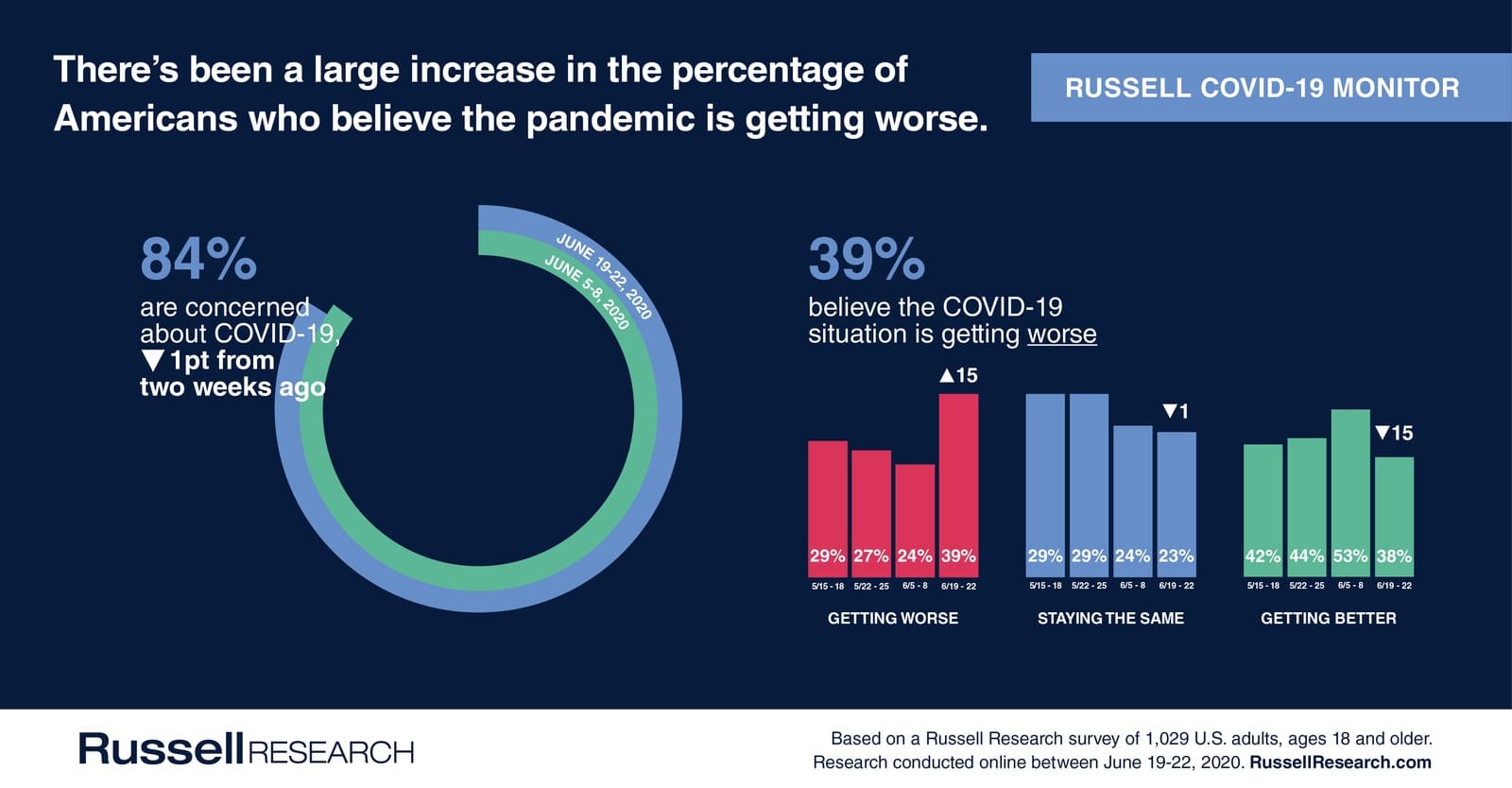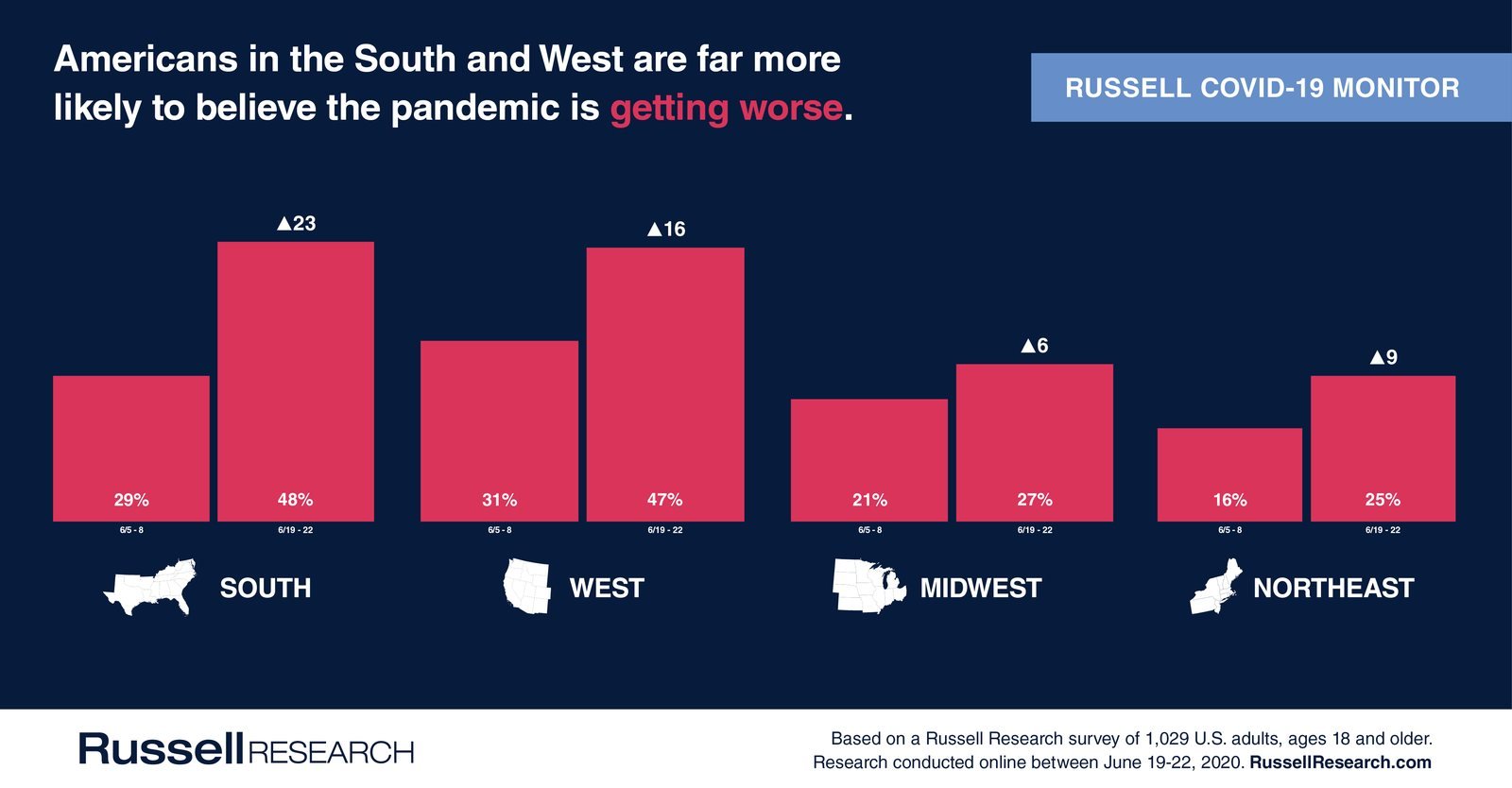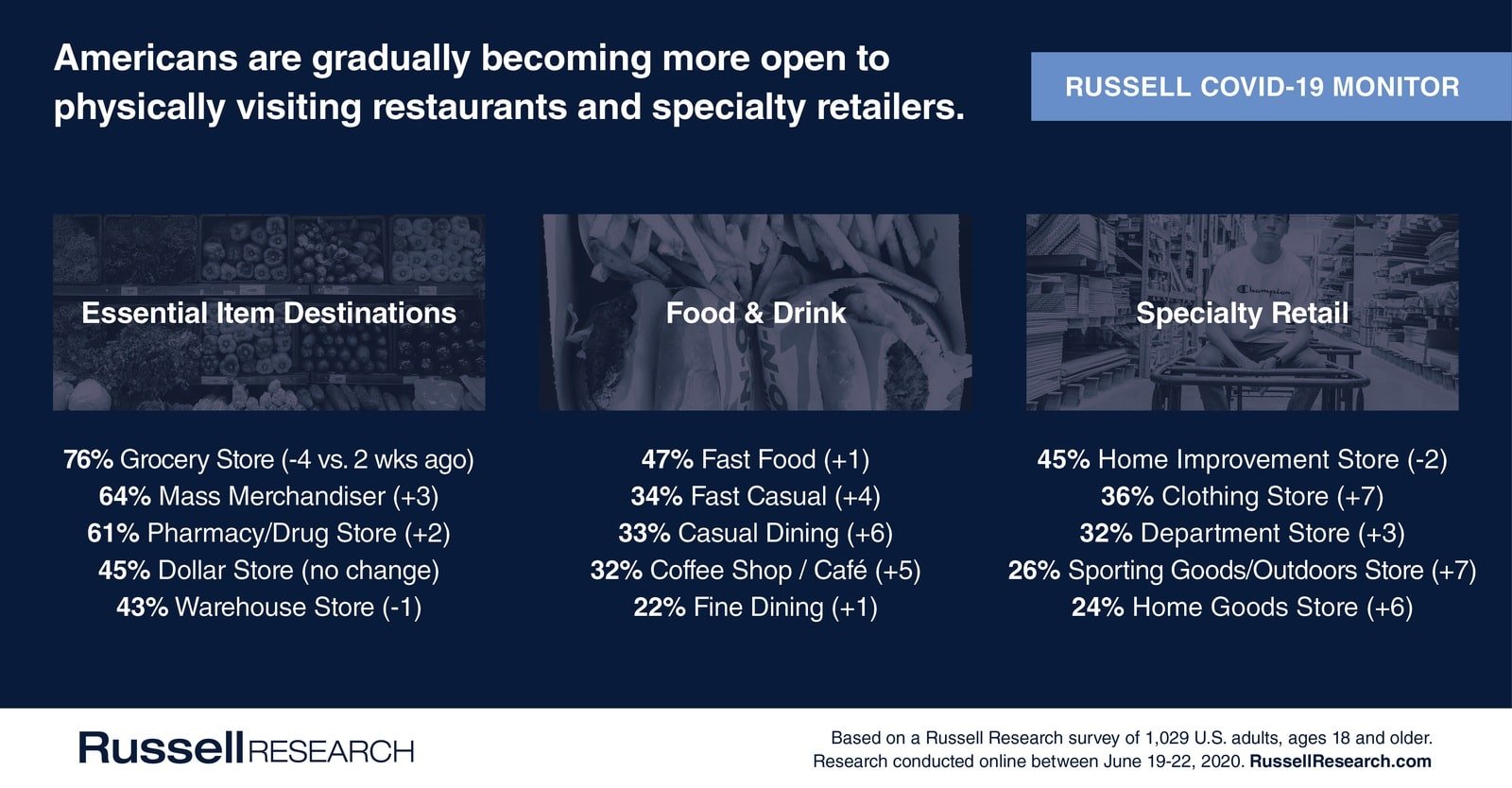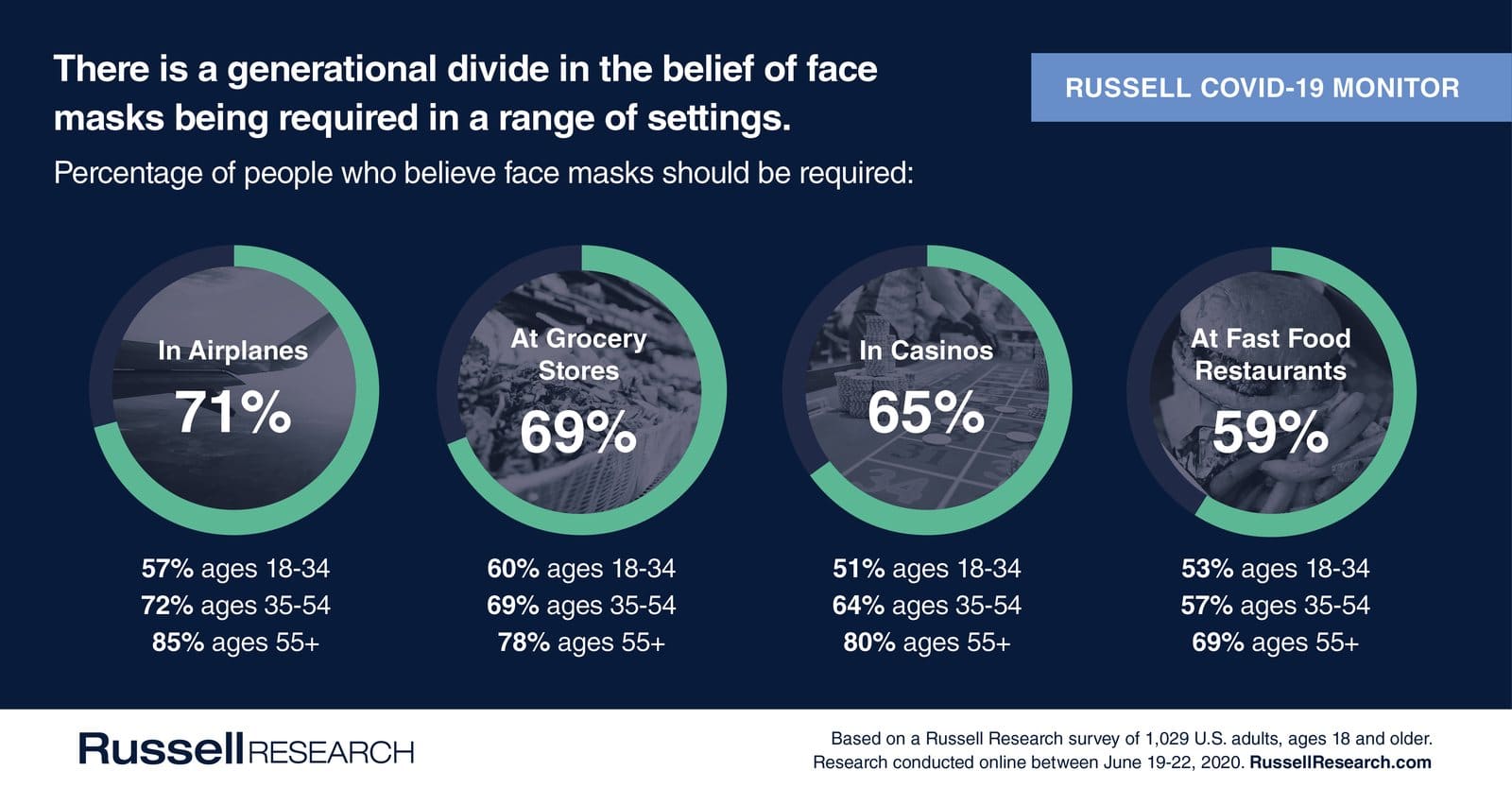COVID-19 & Its Impact on Everyday Life: June 19-22, 2020
Two weeks ago, over one-half of Americans thought the pandemic’s trajectory was positive. This was short-lived.
39% of Americans now believe the pandemic is getting worse – a 15-percentage point increase compared to two weeks ago. Meanwhile only 38% believe it’s getting better, a 15-point decrease.
The South and West regions of the country have experienced large increases in the daily number of new COVID-19 cases and that appears to be reflected in this week’s findings. Nearly half of Americans who live in these regions believe the pandemic is getting worse.
Most Americans have remained concerned with COVID-19 through the ups and downs of the pandemic trajectory. 84% of Americans are currently concerned about COVID-19. This level of concern has been stable since the beginning of May.
The near-universal concern and uneven recovery are likely contributing to a very gradual return to in-person dining and shopping. There was mostly positive movement this week in the percentage of category users who plan to shop in-person at a variety of specialty retailers and dine at different restaurant formats. This includes significant increases for casual dining restaurants and clothing, sporting goods/outdoors, and home good stores. However a majority of users are still not ready to return to any of these places.
This week’s survey also gauged public opinion regarding face mask requirements imposed either by government or individual retailers and restaurants. There are both generational and political divides on whether this should be mandated. There is a stronger belief in requirements being necessary as age increases, while a much higher percentage of Democrats believe face masks should be required.
Russell Research has interviewed over 14,000 Americans over the past 3 months about their coronavirus concerns and its impact on everyday behavior. Our COVID-19 Monitor will evolve in the coming weeks as the situation changes. The study currently fields every other week with the next wave slated for July 3-6, 2020.
Below are our key findings from June 19-22, 2020. Russell Research has tabulated data available for all 14,000+ interviews with several additional questions asked in the survey. Please email [email protected] for more information.
Views of the Current Situation
Concern remains prevalent though gradually trends downward. Between June 19-22, 84% of Americans indicated they are concerned about coronavirus, compared to 85% from two weeks prior.
There has been a sharp reversal in the perceived trajectory of COVID-19. 39% of Americans now believe the situation is getting worse, compared to 24% two weeks ago. A near equal percentage (38%) feel that the current situation is getting better, compared to 53% two weeks ago.
The trajectory is particularly concerning to Americans in the South and West.
- 48% of Americans in the South believe the situation is getting worse (+23 percentage points vs. two weeks ago)
- 47% of Americans in the West believe the situation is getting worse (+16)
- 27% of Americans in the Midwest believe the situation is getting worse (+6)
- 25% of Americans in the Northeast believe the situation is getting worse (+9)
Reopening America
There has been minimal change in the percentage of category shoppers who will physically enter and shop at essential item destinations over the next month.
Essential Item Destinations
- 76% of grocery shoppers intend to shop at a grocery store in the next month (-4 percentage points vs. two weeks ago)
- 64% of category shoppers intend to shop at a mass merchandiser in the next month (+3)
- 61% of category shoppers intend to shop at a pharmacy or drug store in the next month (+2)
- 45% of category shoppers intend to shop at a dollar store in the next month (no change)
- 43% of category shoppers intend to shop at a warehouse store in the next month (-1)
There has been positive movement for in-person dining consideration at all restaurant categories. However more than half of category users are not currently ready to dine-in.
Food & Drink
- 47% of category users intend to dine at a fast food restaurant in the next month (+1)
- 34% of category users intend to dine at a fast casual restaurant in the next month (+4)
- 33% of category users intend to dine at a casual dining restaurant in the next month (+6)
- 32% of category users intend to go to a coffee shop or café in the next month (+5)
- 22% of category users intend to dine at a fine dining restaurant in the next month (+1)
In-person shopping intent at most specialty retail categories is trending upward. This includes significant increases for clothing, sporting goods/outdoors, and home good stores.
Clothing & Specialty Retail
- 45% of category shoppers intend to shop at a home improvement store in the next month (-2)
- 36% of category shoppers intend to shop at a clothing store in the next month (+7)
- 32% of category shoppers intend to shop at a department store in the next month (+3)
- 28% of category shoppers intend to shop at a pet store in the next month (+2)
- 26% of category shoppers intend to shop at a sporting goods or outdoors store in the next month (+7)
- 24% of category shoppers intend to shop at a home goods store in the next month (+6)
- 24% of category shoppers intend to shop at an electronics store in the next month (+2)
- 24% of category shoppers intend to shop at a shoe store in the next month (+4)
- 23% of category shoppers intend to shop at an auto parts store in the next month (no change)
Facemasks & Society
A majority of Americans believe face masks should be required in a range of travel, shopping, dining, and entertainment settings.
- 71% of Americans believe face masks should be required on airplanes
- 69% believe face masks should be required in grocery stores
- 68% believe face masks should be required in movie theatres
- 66% believe face masks should be required in shopping malls
- 65% believe face masks should be required in casinos
- 64% believe face masks should be required in large stores
- 59% believe face masks should be required in fast food restaurants
There are vast differences in requirement perceptions by age and political affiliation.
Airplanes
- 57% of adults ages 18-34 believe face masks should be required
- 72% of adults ages 35-54
- 85% of adults ages 55 and older
- 80% of Democrats
- 63% of Republicans
Grocery Stores
- 60% of adults ages 18-34 believe face masks should be required
- 69% of adults ages 35-54
- 78% of adults ages 55 and older
- 78% of Democrats
- 55% of Republicans
Casinos
- 51% of adults ages 18-34 believe face masks should be required
- 64% of adults ages 35-54
- 80% of adults ages 55 and older
- 76% of Democrats
- 53% of Republicans
Fast Food Restaurants
- 53% of adults ages 18-34 believe face masks should be required
- 57% of adults ages 35-54
- 69% of adults ages 55 and older
- 72% of Democrats
- 43% of Republicans











